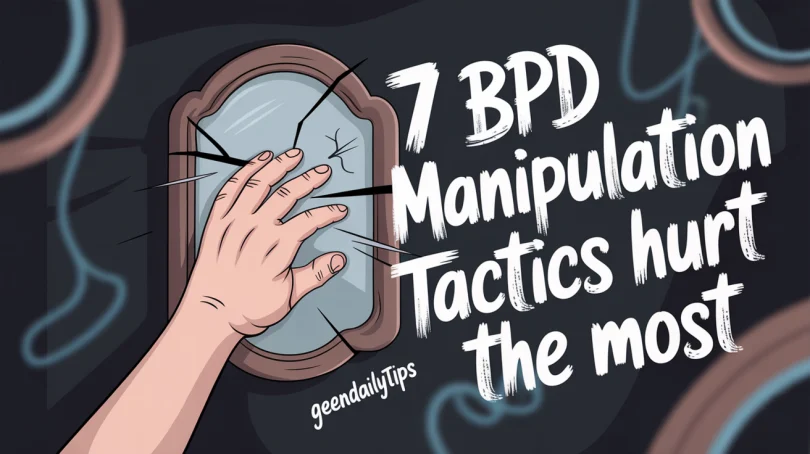Suppose you’re in a relationship with someone who has borderline personality disorder, or BPD for short. In that case, you may find that you’re often being pushed to the edge emotionally, as your partner creates situations that force you to constantly prove your love and loyalty.
But the problem is that no amount of proof or reassurance is ever enough, because their fear of abandonment is deeply rooted in trauma, often stemming from early attachment wounds. So, even when they are begging you not to leave, they can simultaneously say and do things that make it nearly impossible to stay. Today, I’m talking about some of the common behaviors and symptoms of BPD that you, as a partner or favorite person, might find extremely manipulative, contradictory, and hurtful.
So, here are seven symptoms and behaviors of someone with BPD, in no particular order, that may lead to the unraveling of the relationship.
1. Inability to Self-Soothe
People with BPD experience incredibly intense emotional highs and lows that can shift quickly without any clear cause. And what might seem minor or manageable to most people can feel catastrophic to someone with BPD because of their emotional sensitivity.
Without treatment, they don’t have the tools to manage these emotional tidal waves. And instead of being able to pause, reflect, and calm themselves, they tend to act on impulse, projecting their pain onto others and reacting in emotional ways that seem dramatic and completely out of proportion to the situation.
The whole thing is amplified by their emotions and magnified, so it feels very real and very threatening. And in these moments, they can spiral into anger, panic, or deep sadness, looking to you not only to blame but also to fix how they feel.
They want you to stabilize their emotions, reassure them, and help bring them back to a sense of safety and security, which you might be able to do temporarily, but it’s only a matter of time before the next big wave comes crashing down.
2. Splitting
Splitting means that the person with BPD views things in extremes: all or nothing, good or bad, black or white. So, they go from seeing you as their savior and security blanket to seeing you as a threat or as the villain. And this can happen as a result of a triggering event, again, maybe something that most people would consider minor, but this can cause the person with BPD to switch from seeing you as a savior, as trustworthy, to seeing you as a threat.
And they start to focus on your imperfections, your flaws, your mistakes, and their deep admiration instantly turns into deep fear, which can come out as anger and rage as they shift into survival mode.
After the incident of splitting, there will usually be an intense period of reconnection. And this might include deep, loving conversations, passionate sex, sincere apologies, and a shift back to intense idealization. And this back and forth between idealization and devaluation is incredibly confusing and emotionally draining.
3. Push-Pull Dynamic
After the first stage of the relationship, where everything is magical and heavenly, the borderline’s fear of abandonment and/or engulfment will start to intensify as they become more attached to you and more reliant on you to regulate their emotions and their sense of self. So, what you’ll find is that they might crave deep intimacy and closeness with you one moment but then withdraw from you the next.
One minute, they’re fully invested in you and the relationship, showering you with love and attention, and the next, they’re pulling back, creating emotional distance and acting like they want nothing to do with you, threatening the relationship, or even ending it.
Then, when you start to detach, they’re pulling you back with intense affection, apologies, or promises as their fear of actually losing you sets in. And often, it’s not just their fears or emotional overwhelm that might be driving the push-pull dynamic. You may also pull away to protect yourself, or you might end the relationship out of frustration.
And then, soon after, you might become overwhelmed with feelings of guilt, fear, or nostalgia, and then try to get back together, only to repeat the cycle over and over again.
4. Misinterpretations
A person with BPD is constantly analyzing and overthinking things, which can lead to misinterpretations and exaggerated emotional reactions, where even small issues turn into major conflicts. For example, when you’re speaking, the person with BPD is often analyzing your every word, trying to read between the lines or look for hidden meanings or signs that you’re going to abandon them.
This leads to miscommunication and misunderstandings, where innocent comments or neutral statements are seen as threats, criticisms, or signs of abandonment. As a partner or favorite person, this can make you feel like you’re under a microscope and that everything you say is being twisted and distorted, making it impossible to have a conversation.
So, what should be a simple discussion quickly escalates into an emotional storm, with the person with BPD perceiving what you’re saying as something completely different from what you’re trying to say.
5. Self-Destructive Behaviors
People with BPD struggle with self-worth, and they are their own worst enemy. They often go into episodes of hating themselves, seeing themselves as bad, damaged, and defective. And this can lead to self-destructive behavior as they aim to punish themselves and also to sabotage relationships that they don’t believe they deserve.
For you, as the partner or favorite person, you easily see their worth, and you can’t understand how they can’t see it, but you feel helpless because your efforts to reassure and validate them can feel like you’re hitting a brick wall.
No matter how often you tell them how much you love them, how worthy they are, they just struggle to believe it, and their internal narrative is so strong and deeply rooted in shame that this reassurance can often get drowned out by self-loathing. And sometimes, even the more love, kindness, and support you offer, the more it triggers their belief that they’re undeserving of this love. And it leads them to question your motives, push you away, not trust you, or sabotage the relationship.
6. Emotional Blackmail
Emotional blackmail is when someone threatens, uses guilt, or makes ultimatums to manipulate and control their partner’s feelings and actions. In a relationship with someone with BPD, this often stems from fear of abandonment and/or engulfment.
For example, when they sense even the slightest distance, real or imagined, they will feel abandoned, and they may resort to overt threats like, “If you leave me, I’ll hurt myself,” or maybe more subtle threats like, “I don’t know how much longer I’ll be here if you don’t come back.” Emotional blackmail is driven by a need to keep you close, but ironically, it tends to do the opposite, leading you to feel resentful and pressured, making you feel trapped, guilty, and obligated.
This kind of emotional manipulation can make you feel as if you don’t do what they want, you’ll lose their love and trust, or you’ll have failed them, or you’ll be the reason that they hurt themselves. And in the end, it makes you feel like you have to put your needs and boundaries aside to keep them from following through on their threats and ultimatums.
7. Constant Testing
People with BPD have an intense fear of abandonment, as you know, and once they are attached and bonded to someone, it’s like a switch flips in their brain, and they start watching closely for any signs of abandonment. A change in your facial expression, tone, mood, or behavior, no matter how innocent or unrelated, can be interpreted as a sign that you’re going to leave them.
And this can cause them to constantly seek reassurance and then not believe any of the reassurance that you do provide, even if it’s honest and sincere. They think that you’re mad, that you don’t care, that you’re cheating, and that you’re getting ready to leave them, which can cause them to push you away or sabotage the relationship, even though they’re desperate to hold on to you.
They might pick fights, create conflict, and constantly test your love and loyalty. They might even do extreme things, like cheat on you, subconsciously confirming their deepest fear that they’re unlovable, broken, and that you are going to leave. It’s a painful paradox because they crave closeness and intimacy, and yet fear it and are terrified of it.
So, as the partner or favorite person of someone with BPD, you might experience several emotional challenges as the relationship starts to unravel into this complete death spiral that you don’t know how to stop.
You might feel emotionally exhausted and stressed out from constantly providing reassurance, striving to earn trust, managing intense emotional episodes, and dealing with crisis after crisis.
The constant testing and distrust can make you feel inadequate, as though you’re not good enough, making you feel like a failure. You’ll likely feel confused and incredibly frustrated by the unpredictable mood swings, contradictory behaviors, and hurtful accusations.
You may feel like you’re losing your sense of self, as your whole life revolves around meeting their needs and trying to keep them stable. You might feel like you’re always on edge, anxious, and afraid of triggering the next emotional outburst. Over time, this can lead to depression, making you feel hopeless, emotionally numb, and sad.
As you internalize the blame, you might start feeling guilty, apologizing for things that aren’t your fault, and working even harder to prove yourself at the expense of your own needs, boundaries, and well-being.
But at some point, you might have to accept that love alone isn’t enough to fix the situation. Without meaningful therapy and a willingness to change or seek help, continuing the relationship might come at too high a cost. That said, if they are open to doing the work, like committing to consistent, intensive, evidence-based treatment like dialectical behavior therapy, they can learn to better manage their emotions and behaviors.






